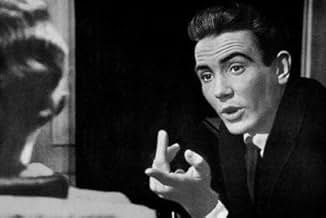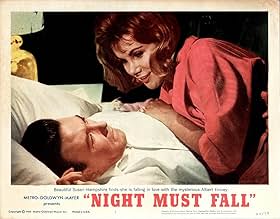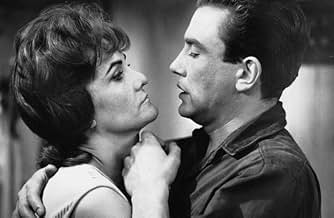Night Must Fall
- 1964
- 1 घं 41 मि
IMDb रेटिंग
6.5/10
1.1 हज़ार
आपकी रेटिंग
अपनी भाषा में प्लॉट जोड़ेंA psychotic killer gets in the good graces of his aging invalid employer, and worms his way into the affection of her beautiful daughter, with unpleasant results for all.A psychotic killer gets in the good graces of his aging invalid employer, and worms his way into the affection of her beautiful daughter, with unpleasant results for all.A psychotic killer gets in the good graces of his aging invalid employer, and worms his way into the affection of her beautiful daughter, with unpleasant results for all.
- पुरस्कार
- कुल 1 नामांकन
Joe Beckett
- Detective
- (बिना क्रेडिट के)
George Curtis
- Member of Search Party
- (बिना क्रेडिट के)
Fred Davis
- Police Officer
- (बिना क्रेडिट के)
Richard Neller
- Guest
- (बिना क्रेडिट के)
Emile Stemmler
- Waiter
- (बिना क्रेडिट के)
फ़ीचर्ड समीक्षाएं
Just watched this film on TCM. Quite enjoyable and not as bad as I'd heard from reviews I'd read over the years. My only problem was that I was expecting to understand more about Finney's character by the end of the film (ie: what lead to his psychotic behaviour, what had gone wrong in his childhood...that kind of thing), but never got any deep insight at all. Which for me made him rather a 1 dimensional screen psycho - and therefore the film was not as interesting as it should have been. And the end of the movie was a ..."so what?" affair.
Did I miss something?
Or was I expecting a movie with more depth than it actually had?
Did I miss something?
Or was I expecting a movie with more depth than it actually had?
To start with a little off-topic note: in 2003, Tim Burton made the film "Big Fish" which stars Ewan McGregor as a younger version of Albert Finney. When you actually see "Night Must Fall", which was shot around the time when Finney was in his late 30's, it becomes obvious how good this casting choice was! From multiple camera angles, McGregor really looks a lot like the young Finney and the facial expressions are almost exact. "Night Must Fall" itself is a truly interesting and involving thriller and I wonder why on earth it's so underrated! This is a remake of a 1930's thriller that stars Finney as a dangerous, yet very charismatic psychopath who systematically works his way up in a high-society family as a pageboy. After a while, the elderly lady and her daughter grow really fond of him but his mind and intentions are still disturbed. The film has a terrific opening sequence (the frightening image of Danny getting rid of his murder victim) and an extremely suspenseful finale! Everything in between is a bit too talky and at times somewhat dull, but you keep watching since Finney's performance is so outstanding. Especially the scenes in which he relives his vile crimes up in his room (forcefully holding the hat-box that contains grim trophies) are very tense and unsettling. Reisz' directing is well-handled but it merely is Freddie Francis' imaginative photography that makes this film so dreamy and beautiful. Francis unquestionably was Britain's best cinematographer of that time and he also directed a couple of entertaining horror films ("Trog", "The Creeping Flesh", "Tales that Witness Madness
")
This project was done in a hurry when a proposal to make a film of Ned Kelly was axed by MGM due to budget worries (at this time Tom Jones had been filmed but not released).
It is not clear why Riesz decided to make a film of this play. Clearly, the part of Danny is tailor made for some show-off acting and Finney grabs the bull by the horns here. His only real mistake is to put on a silly 'boyo Welsh accent. True, the character was Welsh in the play but that's because the part was written by the playwright to play himself. Otherwise, there is no dramatic need for Danny to have a Welsh accent and Robert Montgomery didn't bother in the 1937 version.
The main difference between the film and the play is that the film reveals its hand in the first minute that Danny is a psycho killer. In the play, its not clear until near the end and much of the dialogue are cat n'mouse exchanges between Danny and Olivia.
The result of this is to create a somewhat boring film; you know who the killer is and thus spend an hour and a hour waiting for him to explode. When he does, it has little logic and, to an audience used to the likes of Psycho and its rip-offs like Homicidal, seeing Finney deliver one blow to an off-screen body that you never get to see was always going to be a serious let-down. His retreat into gibberish at the end I thought was uncharacteristic and a cop-out. You never find out who the real Danny is and why he has acted like he has done. I did enjoy the 'hangbags' between Sheila Hancock and Susan Hampshire on the high street of an authentically 60s wet Hertfordshire town.
It is not clear why Riesz decided to make a film of this play. Clearly, the part of Danny is tailor made for some show-off acting and Finney grabs the bull by the horns here. His only real mistake is to put on a silly 'boyo Welsh accent. True, the character was Welsh in the play but that's because the part was written by the playwright to play himself. Otherwise, there is no dramatic need for Danny to have a Welsh accent and Robert Montgomery didn't bother in the 1937 version.
The main difference between the film and the play is that the film reveals its hand in the first minute that Danny is a psycho killer. In the play, its not clear until near the end and much of the dialogue are cat n'mouse exchanges between Danny and Olivia.
The result of this is to create a somewhat boring film; you know who the killer is and thus spend an hour and a hour waiting for him to explode. When he does, it has little logic and, to an audience used to the likes of Psycho and its rip-offs like Homicidal, seeing Finney deliver one blow to an off-screen body that you never get to see was always going to be a serious let-down. His retreat into gibberish at the end I thought was uncharacteristic and a cop-out. You never find out who the real Danny is and why he has acted like he has done. I did enjoy the 'hangbags' between Sheila Hancock and Susan Hampshire on the high street of an authentically 60s wet Hertfordshire town.
The remake of the 1937 film was slaughtered both by critics and audience at the time it premiered and there was mainly one reason for it:the crazed fans of Albert Finney were absolutely shocked,as he daringly chose the role of the psychotic ''killer with the angelic face'', following his all-time favorite roles of ''Saturday night and Sunday morning''and, particularly, ''Tom Jones''.As many historians mention, the ''MGM wives'' who were few of the first to see the film, turned violently against the gifted director, Karel Reisz, shouting ''what have you done to that beautiful boy?''!But this is not a serious reason to dismiss an, overall, very good film, which, however, has some serious flaws.The use of music is exaggerated and some times irritating and, only in the first part of the film, Finney doesn't quite know how to tackle with his disturbed character. But the photography is great, Mona Washbourne gives a superb performance and Karel Reisz does a great job, not only updating the old text and bringing it within the ''realism'' of the British Free Cinema movement, but also with his masterful camera movements and his use of editing and abruptly cutting to different scenes, he creates an imposing psychological thriller, where what you don't see is more disturbing than what you do. Being one of the greatest actors EVER, Finney soon finds a convincing attitude for his character and the last part of the film is absolutely brilliant as a whole.It should be re-examined and re-appreciated, that's why it has to come out on VHS and DVD a.s.a.p.! 7.5/10
A critical failure at the time of its release and considered something of a let-down for its director and star, (it was certainly an odd choice of material), this 1964 film version of Emlyn Williams' play, (it was written in 1935 and filmed two years later with Robert Montgomery), is nowhere near as bad as people say. It's the one about the young psychopath, (a terrific Albert Finney), who worms his way into the affections of elderly invalid Mona Washbourne, (superb), and her initially stand-offish daughter, (an excellent Susan Hampshire). The problem is that in attempting to get to the psychological heart of the piece director Karl Reisz drains it of all suspense and Clive Exton's screenplay, (I haven't seen or read the original play), is a bit on the dull side. But neither is it a disaster and I have never understood why it disappeared so soon after its initial appearance.
क्या आपको पता है
- ट्रिवियाKarel Reisz and Albert Finney had spent a year, including 10 weeks scouting Australian locations, developing a "Ned Kelly" project, but after Columbia finally pulled the plug, they quickly set up "Night Must Fall" at MGM.
- गूफ़When Olivia is driving home from town, and it's pouring down, there is very heavy 'rain' falling in front of the car as she goes down the hill. In the near background, all of the treetops are still.
- कनेक्शनFeatured in MGM Is on the Move! (1964)
टॉप पसंद
रेटिंग देने के लिए साइन-इन करें और वैयक्तिकृत सुझावों के लिए वॉचलिस्ट करें
- How long is Night Must Fall?Alexa द्वारा संचालित
विवरण
- रिलीज़ की तारीख़
- कंट्री ऑफ़ ओरिजिन
- भाषाएं
- इस रूप में भी जाना जाता है
- Al caer la noche
- फ़िल्माने की जगहें
- उत्पादन कंपनियां
- IMDbPro पर और कंपनी क्रेडिट देखें
- चलने की अवधि
- 1 घं 41 मि(101 min)
- रंग
- पक्ष अनुपात
- 1.66 : 1
इस पेज में योगदान दें
किसी बदलाव का सुझाव दें या अनुपलब्ध कॉन्टेंट जोड़ें


























